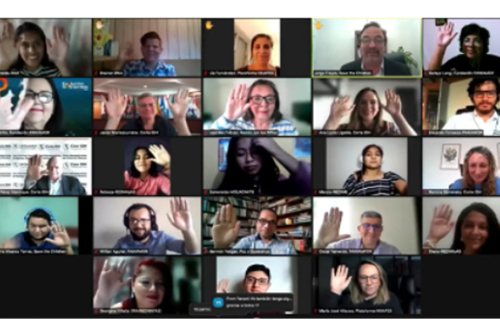
On Tuesday, November 16, the third Dialogue on Children and Teenagers in Latin America and the Caribbean and the Inter-American Court of Human Rights was held.
The Inter-American Court, together with the Paniamor Foundation, Save the Children and the Swedish Cooperation Agency, held the panel seeking to promote a rapprochement between children and teenagers and the Inter-American Court. Young people were able to talk with the Court authorities about experiences, proposals and concerns around generating favorable conditions for the ethical, safe and meaningful participation of minors in the Court’s mechanisms.
Through active listening, they reflected on the achievements made and the areas for improvement in order to guarantee the rights of the child. The objective is to raise visibility about the main problems affecting young people that reflect violations of their rights, so that the Inter-American Court is aware of them and, together with the organizations, can work together to enforce the rights of all children and teenagers.
The activity began with a welcome by Mrs. Milena Grillo, Director of Strategy and Innovation of the Paniamor Foundation, Mrs. Rebeca Arévalo, representative of REDNNyAS and Dr. Ricardo Pérez Manrique, Judge of the Inter-American Court.
In his first intervention, Judge Pérez Manrique affirmed that: "we are committed to childhood, to the need to open arenas and the widest opportunities for listening, but also to a need to cooperate and build mutual exchange." In turn, he also assured that this dialogue will be maintained over time because the Inter-American Court believes it is essential to listen to the voices of young people and take their opinions into account, as stated in the Convention on the Rights of the Child which sees children and teenagers as being actors with rights. “Your best interests must be duly taken into account. Today our fundamental role is to listen to you.”
The first segment called "Participation of children and teenagers in Advisory Opinion number 29", featured presentations by young people belonging to the NNAPES platform, who shared their experiences and recommendations.
On this occasion, the spokespersons were 17-year-old Constanza Silva, from Chile and Matilde Raw, also 17, from Nicaragua. They divided their recommendations into three stages: a stage prior to the participation in events, a stage of participation of the Inter-American Court and the post-participation stage. One of their proposals was to raise awareness and train the staff of the Inter-American Court about being a child or teenager and to create the conditions to ensure their participation in activities.
In the second segment, the participation of young people in international tribunals was discussed. For this, Soraya Long, from Paniamor, stated “we know about best practices for the real participation of children and teenagers in international bodies for the protection of human rights”, concluding that it is not about specialized justice, but specialized and different care.
Diana Cordero then mentioned the contributions from REDNNyAS on her experience of participation in the Committee on the Rights of the Child and the Human Rights Council (UPR).
After these presentations, a space for questions was held by representatives of the networks of children and teenagers. Highlights among the questions asked were, "what are the mechanisms that children and teenagers’ organizations must have to file complaints regarding the violation of their rights?" and "how could the Inter-American Court intervene in situations that occur in Peru, especially child marriage, which do not allow many young people, particularly the most vulnerable, to develop and excel in the same conditions?".
On this, Dr. Pérez Manrique mentioned that the United Nations Committee on the Rights of the Child takes the position that marriage must only be permitted after 18 years of age. “This has to do with the fact that the marriage of girls, in particular, often leads to conditions of abuse, mistreatment and negotiations between adults (…), which end up being a real violation of their rights, and nothing more because it affects the right to decide, the right to autonomy, and their fundamental physical, psychological and sexual rights." He also clarified that it is not possible for the Inter-American Court to take its own initiative to address a matter, and complaints must first be presented as a preliminary step, since the entity cannot be accessed directly.
Judge Pérez ended his participation by saying that “when we started this event, I said that we came with our eyes and ears open to listen to all the suggestions and we duly noted all the suggestions on how we have to relate before, during and after. This is extremely important to us. There has been a great advance in national justice systems and in the International System for the Protection of Human Rights. Special attention has to be paid to these advances, incorporating them into its functioning.”
The closing session was led by Mr. Jorge Freire from Save the Children. A formal delivery of documents was made to the Inter-American Court and young people were again given the floor to reflect on the statements made. "We are the present and there is still much to continue working on," they concluded.
Thanks to these encounters, there is the possibility of generating new ways of relating to facilitate the discovery of increasingly effective paths that can make the mechanisms that exist today ever more permeable and user-friendly, allowing children and teenagers to be present not as objects but as active subjects with rights.
“We have to continue advancing in this view and in the ability to open ourselves up, to get out of those internalized structures that we have and be able to integrate generations in this intergenerational encounter, not as adults and young people, but as citizens committed to working together for the rights of children and teenagers”, indicated Freire.